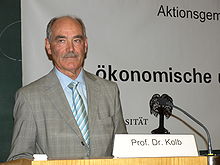Frank Kolb

Frank Kolb (born February 27, 1945 in Rheinbach -Merzbach) is a German ancient historian .
Frank Kolb received his doctorate in 1970 at the University of Bonn with the work, initiated and supervised by Johannes Straub , Literary Relationships between Cassius Dio , Herodian and the Historia Augusta . From 1970 to 1972 Kolb was Andreas Alföldi's assistant at the Institute for Advanced Study in Princeton, and from 1973 to 1977 assistant professor at the Free University of Berlin . He completed his habilitation in 1975 at the Free University of Berlin with a thesis on "Theater Audiences and Society in the Greek World".
Kolb was a full professor of ancient history at the University of Kiel from 1977 to 1986 before accepting a professorship at the University of Tübingen , where he taught until his retirement in 2013, in 1994 he turned down a full professorship at the University of Zurich . Kolb taught as a visiting professor at several foreign universities and research institutes. His successor was Sebastian Schmidt-Hofner in February 2014 . In 1999/2000 Kolb was a research fellow at the Historical College in Munich.
Kolb, who carried out archaeological field research in the ancient landscape of Lycia in south-western Turkey from 1989 to 2001, is one of the most prominent ancient historians in Germany and has published important works on a whole range of topics - from archaic Greece to late Roman antiquity .
Kolb's students include Ralf Behrwald , Thomas Blank , Hartmut Blum , Hartwin Brandt , Marc Domingo Gygax , Ulf Hailer , Oliver Hülden , Hilmar Klinkott , Christina Kokkinia , Jens-Uwe Krause , Gisela Rumpp , Aysun Sanli-Erler , Christof Schuler , Nils Steffensen , Andreas Thomsen , Werner Tietz , Darío N. Sanchez Vendramini , Martin Zimmermann and Nicola Zwingmann .
Kolb became known to a wider public in 2001 when he and the archaeologist Manfred Korfmann engaged in an increasingly bitter dispute about Korfmann's interpretation of the excavation findings in Troy . Associated with this was the epistemological question of the value of different methodological approaches to prehistory and early history . While Kolb's position was widely accepted by ancient historians, the judgment of archaeologists and linguists was different, which became clear at the Troy Symposium (2002) and in later publications. With the death of Korfmann (2005) at the latest, the Troy debate largely came to a standstill.
Kolb has been a corresponding member of the German Archaeological Institute since 1994 . In 1997 he was awarded the Max Planck Research Prize. Since 1999 he has been a full member of the Heidelberg Academy of Sciences .
Fonts
Kolb is editor of the Lykische Studien series , Volumes 1–10, Bonn
- Literary relations between Cassius Dio, Herodian and the Historia Augusta. (= Antiquitas , Series 4: Contributions to Historia Augusta Research , Volume 9), Habelt, Bonn 1972, ISBN 3-7749-1166-5 . [Dissertation]
- Agora and theater, public and festival assembly. ( Archaeological Research , Volume 9), Mann, Berlin 1981, ISBN 3-7861-1262-2 . [Habilitation]
- The city in ancient times. Munich 1984, ISBN 3-406-03172-2 .
- Investigations on the Historia Augusta. (= Antiquitas , Series 20: Contributions to Historia Augusta Research , Volume 9), Habelt, Bonn 1987, ISBN 3-7749-2316-7 .
- Diocletian and the First Tetrarchy. Improvisation or experiment in monarchical rule? (= Studies on Ancient Literature and History , Volume 27), De Gruyter, Berlin and New York 1987, ISBN 3-11-010934-4 .
- with Barbara Kupke: Lykien. Ancient history of Lycia. (= Zabern's illustrated books on archeology , Volume 2 / Special Issues of the Ancient World ), von Zabern, Mainz 1992, ISBN 3-8053-1415-9 . [also special issue of the Ancient World 1989/2]
- Rome. The history of the city in ancient times. (= Beck's historical library ), CH Beck, Munich 1995, ISBN 3-406-46988-4 . [2. Edition 2002]
- Ruling ideology in late antiquity. (= Study books History and Culture of the Old World ), Academy, Berlin 2001, ISBN 3-05-003432-7 .
- with Hartwin Brandt : Lycia et Pamphylia. A Roman province in southwest Asia Minor. (= Zabern's illustrated books on archeology , Volume 2 / Special Issues of the Ancient World / Orbis Provinciarum ), von Zabern, Mainz 2005, ISBN 3-8053-3470-2 .
- Castle - Polis - Bishopric. History of the settlement chamber of Kyaneai in southwestern Turkey. von Zabern, Mainz 2008, ISBN 978-3-8053-3900-1 .
- Ancient Rome. History and archeology. (= CH Beck Wissen ), CH Beck, Munich 2007, ISBN 978-3-406-53607-6 . [2. Edition 2009]
- Crime scene »Troy«. History - Myths - Politics. Ferdinand Schöningh, Paderborn 2010, ISBN 978-3-506-77009-7 .
- Lycia. History of an ancient landscape. Philipp von Zabern, Darmstadt 2018, ISBN 978-3-8053-5178-2 .
- Editor: Chora and Polis. (= Writings of the Historical College. Colloquia , Volume 54), Munich 2004, ISBN 978-3-486-56730-4 ( digitized version ).
Web links
- Literature by and about Frank Kolb in the catalog of the German National Library
- Page at the University of Tübingen
- Interview by Kolb on the Troy debate
| personal data | |
|---|---|
| SURNAME | Kolb, Frank |
| BRIEF DESCRIPTION | German ancient historian |
| DATE OF BIRTH | February 27, 1945 |
| PLACE OF BIRTH | Rheinbach |
